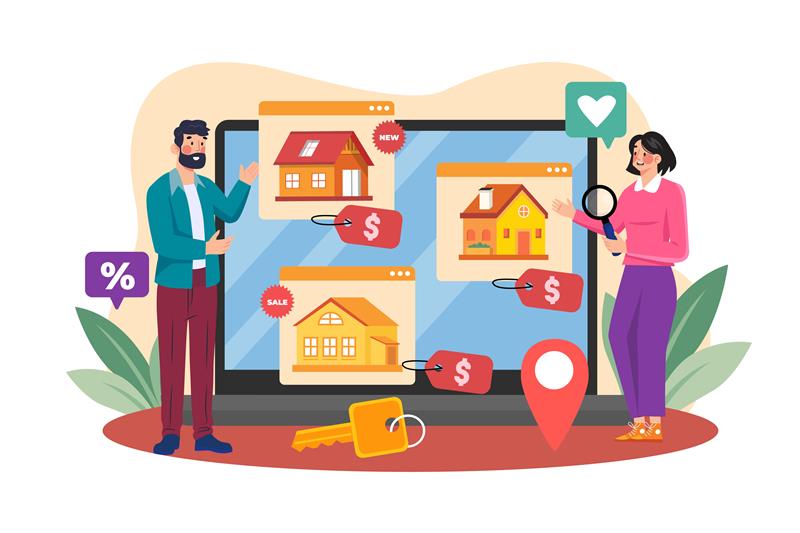Standing out in any profession is no easy task. In this age of digital marketing and increasingly competitive housing market, it becomes even more difficult. Professional photos, virtual tours, and optimized listings are essential — but they’re not always enough to capture the attention of today’s digital-first buyers. This is where influencer marketing can play a transformative role.
While influencer collaborations are often associated with fashion, beauty, or travel, real estate marketing is quickly catching up. By partnering with the right influencers, agencies and realtors can reach niche audiences, build credibility, and generate high-quality leads that traditional advertising might miss.
Read this blog to explore how to effectively use influencer marketing to enhance your real estate listings, build trust, and drive more conversions.
Why Influencer Marketing Works for Real Estate
Influencer marketing thrives on trust and relatability. People view influencers as their friends, advisors, and major well-wishers rather than a distant brand. This connection allows influencers to inspire action in ways traditional ads cannot.
In real estate, this trust factor is crucial. Home buying and investing are deeply personal and emotional decisions. Audiences want authenticity — not just polished listings. Influencers, especially local and lifestyle creators, can provide this authenticity by showcasing properties from a real-world perspective.
Some key reasons influencer marketing fits the real estate industry include:
1. Expanded Reach: You can tap into audiences beyond your brand’s immediate followers through influencers.
2. Authentic Storytelling: Influencers can build relevance and relatability by highlighting the lifestyle that comes with a property, not just its square footage.
3. Local Relevance: Partnering with local influencers adds person-next-door context — showcasing nearby amenities, restaurants, schools, and community culture.
4. Social Proof: Endorsements from trusted creators make your listings appear more credible and desirable.
Choosing the Right Influencers for Real Estate Campaigns
Not all influencers are a perfect fit for property marketing. The key is finding creators whose audiences align with your target buyers or investors. Here’s how to approach this strategically.
1. Focus on Local and Lifestyle Influencers
For real estate, hyperlocal influencers are the perfect choice. They know the community, and their followers likely live in or aspire to move to the area. Think local bloggers, neighborhood photographers, or lifestyle vloggers who highlight city living.
Lifestyle influencers are equally powerful because they help potential buyers envision life in the home. For example:
- A home chef influencer could showcase the property’s modern kitchen.
- A family vlogger might emphasize the spacious backyard or nearby parks.
- A luxury travel influencer could feature high-end listings with resort-style amenities.
2. Check Engagement, Not Just Follower Count
A smaller, more engaged audience often yields better results than a massive but passive following. Review likes, comments, and how authentically followers interact with the influencer.
Micro-influencers (10k–50k followers) are especially effective for real estate because they tend to have niche, community-based audiences and higher engagement rates.
3. Align with Your Brand Values
Ensure that the influencer’s tone, aesthetics, and ethics match your real estate agency’s brand. Real estate buyers are making one of the largest financial decisions of their lives — any hint of inauthenticity can ruin trust and cause long-term damage.
Creative Ways to Use Influencers for Real Estate Listings
Influencer collaborations can take many forms, from social content to live events. Here are some proven strategies:
1. Property Tours and Walkthroughs
Invite influencers to tour a new listing and share their experience on social media. This can include:
- Instagram Reels or TikTok videos: Short, engaging property highlights.
- YouTube home tours: Longer, lifestyle-driven content.
- Instagram Stories: Real-time impressions and Q&A sessions.
Influencers can describe the home’s feel, layout, and standout features in a natural, conversational way. It feels like a friend showing their followers around a dream home — not an ad.
2. Neighborhood Spotlights
Buying a home is as much about the location as the property itself. Collaborate with local influencers to create content about the area — from the best coffee shops to schools, parks, and entertainment venues.
When a potential buyer sees a lifestyle they connect with, they’re more likely to explore your listings in that area.
3. Virtual Open Houses
Influencers can host live virtual tours on Instagram Live, Facebook Live, or YouTube. These sessions allow audiences to ask questions in real time, making them interactive and memorable. It’s a great way to attract out-of-town buyers or investors who can’t attend in person.
4. Giveaways and Collaborations
Consider co-hosting contests or giveaways with influencers to boost engagement — such as a free consultation with your real estate agency, or a “home styling” session for new buyers. This type of campaign drives awareness while positioning your brand as approachable and community-oriented.
5. Behind-the-Scenes Content
Influencers can humanize your brand by sharing behind-the-scenes glimpses — such as prepping a home for sale, working with interior designers, or meeting with new homeowners. This storytelling approach builds connection and trust.
Crafting a Strong Influencer Campaign Strategy
To make influencer marketing effective, you need a solid plan behind the collaboration. Here’s a roadmap to follow:
1. Define Your Goals
Are you trying to increase brand awareness, generate leads, sell a specific listing, or build credibility in a new market? Your goals will shape which influencers you partner with and what type of content to create.
2. Set a Clear Budget
Influencer costs vary widely depending on follower count, engagement rate, and platform. Consider whether you’ll pay with cash, commissions, or other perks (such as exclusive access to properties or brand partnerships).
3. Provide Creative Direction — Without Limiting Creativity
Influencers know their audience best. Give them a clear brief with brand guidelines and key messages but allow them creative freedom. Authenticity is what makes influencer content so effective.
4. Track and Measure Performance
Use trackable links, UTM parameters, or custom promo codes to monitor engagement, web traffic, and conversions from each influencer’s post. Evaluate metrics such as:
- Reach and impressions
- Engagement rate
- Click-through rate
- Lead submissions or inquiries
Data-driven insights will help refine future collaborations and maximize ROI.
Common Mistakes to Avoid
Even experienced marketers can misstep when integrating influencers into their real estate strategy. Watch out for these pitfalls:
1. Choosing influencers based solely on follower count — engagement and relevance matter more.
2. Overly scripted content — it feels inauthentic and reduces trust.
3. Ignoring compliance and disclosure — ensure sponsored content is transparent per advertising guidelines.
4. Failing to follow up with leads — influencer marketing can generate buzz, but success depends on how quickly and professionally you respond.
The Future of Influencer Marketing in Real Estate
As digital media evolves, influencer marketing is becoming a core part of the real estate sales funnel. With the rise of platforms like TikTok, Instagram Reels, and YouTube Shorts, short-form video storytelling is proving highly effective for showcasing homes and communities.
In the near future, we can expect to see even more immersive influencer experiences, such as augmented reality (AR) property previews and virtual neighborhood tours — making influencer marketing an integral part of the buyer’s digital journey.
Final Thoughts
Influencer marketing is no longer a novelty — it’s a powerful tool for real estate brands ready to meet modern buyers where they are: online, social, and mobile.
By collaborating with the right creators, realtors can transform their listings into lifestyle stories, generate authentic engagement, and inspire genuine interest among potential buyers.
The key is authenticity, strategic partnerships, and measurable outcomes. When done right, influencer marketing doesn’t just promote properties — it builds communities, trust, and long-term brand equity.
If your real estate business is looking to elevate its digital presence, now is the time to tap into the power of influencer marketing. Partner with a digital marketing agency that understands both the art of storytelling and the science of conversion — and watch your listings turn into sold signs. Contact Gyaata for a comprehensive marketing strategy that yields tangible results!











